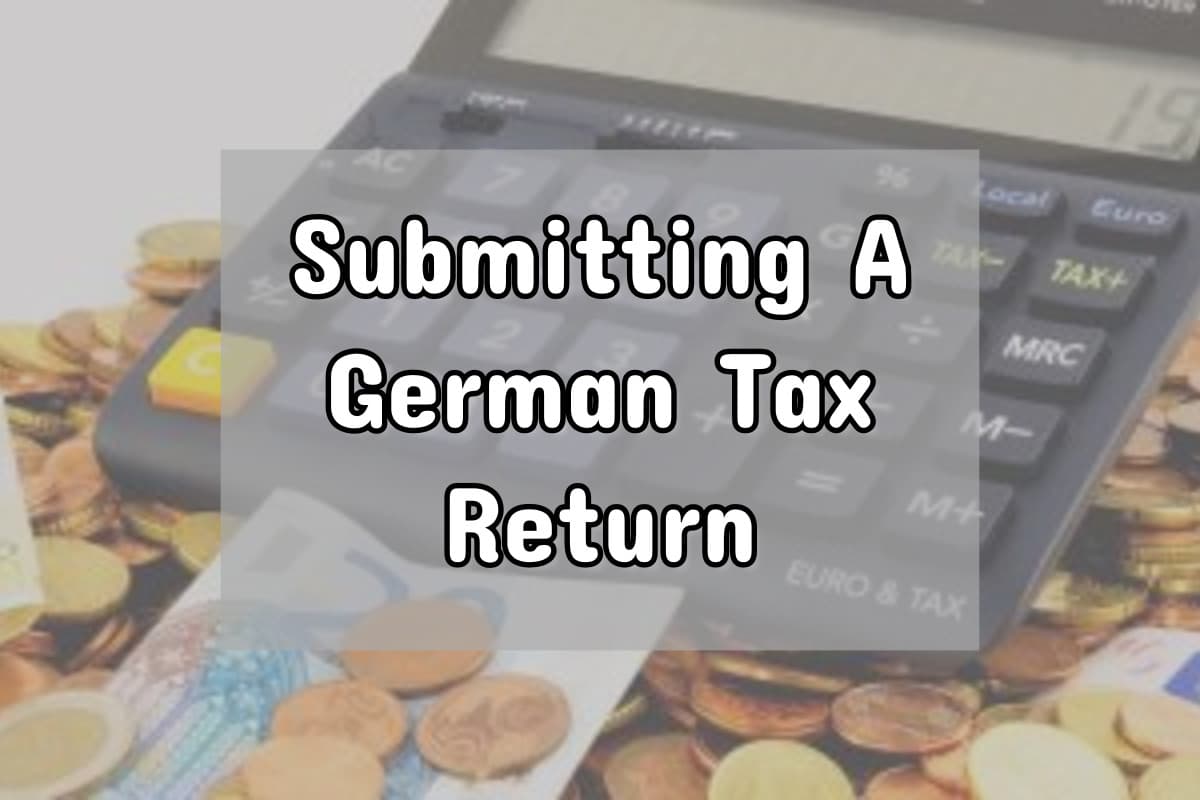Submitting a tax return (German term: Steuererklärung) is not compulsory for regular employees who have no other sources of income other than their job. It is compulsory for the self-employed, or anyone who has income from other sources totalling more than €801 annually. However, even if you’re not obliged to, it’s quite possibly in your interest to submit a tax return.

German Tax Return: You could be due some money back
Regular employees who do not have any income from other sources such as self-employment, savings, investments or rental property generally will not be obliged to submit an annual tax return in Germany.
If this describes you, then you’ll simply have taxes deducted from your earnings at the appropriate tax rate. Check out our guide to German payslips to find out more about these deductions.
However, as we will explore, it may very well be in your interests to complete one even if you don’t have to.
Why? Because of the money you could claim back from the Finanzamt.
Is it worth the effort though? That is a much more complex topic, so we’ll take a look at the essentials to help you decide whether it’s worth the cost and hassle.
Do I have to submit a German tax return?
As we explained, for most employees you won’t need to submit a return.
For the self-employed, it’s compulsory.
This also includes anyone who earns income from self-employment or freelancing on the side as well as having regular employment.
If you have other significant sources of income that amount to greater than €801 for singles (€1,602 for married couples) annually, you will also need to submit a tax return.
The most common forms are capital gains from savings and investments, income from rental property and self-employment as extra side income i.e. coaching, teaching, any paid artistic pursuit, evening or weekend work, or any other business interests.
Why am I obliged to submit a German tax return?
Because the Finanzamt wants to know about any activity you have undertaken where tax is not deductible at source.
Tax is automatically deducted from your payslip by your employer, if you have a regular hourly wage or salaried job.
But any other sources of income are unknown to the revenue collection authorities, and by law you are expected to declare them.
Is submitting a German tax return worth it for you?
Below are a few examples where it will make sense to seriously consider submitting a German tax return.
For higher earners paying a high tax rate, or those with more than one of the criteria below applicable, you could receive a tax refund in the thousands!
This is based on the likelihood of you being able to claim a rebate large enough to make it worth your time (and money, if you decide to go with external help!)
- Daily commuters to the office, whether by car or by public transport (not including company cars or employer-financed public transport tickets)
- Expenses for professional tuition or books as part of your legitimate professional development
- Your first year in Germany if you’ve been taxed for only part of a fiscal year
- Weekend commuters who maintain dual residence i.e. you’re paying rent / mortgage on two apartments because your job is in one city but your life essentially is somewhere else (greater than 100km away is typically the threshold).
- Sending money to support family members overseas or are travellng on a frequent basis to care for a sick parent or next of kin
- Any maintenance or repair work done on your apartment (if you have an invoice). Yes, this also applies if you are a tenant if you’ve paid for maintenance work and the landlord hasn’t picked up the bill.
- Manual labour which is itemised on your annual service charge statement from your landlord. The law allows this to be deducted on your German tax return. Your property management company (Hausverwaltung) or your landlord should list these costs separately. If you understand German, this article provides more info.
Can I submit my tax return in English?
Yes, you can, using third party software.
You may be familiar with the Turbotax App, but it’s not available in Germany. As a German altenative, we recommend a simple, very affordable piece of software called SteuerGo.
NOTE: You can’t submit business taxes using this software.
The official ELSTER portal (see below) is only in German, so you’ll need SteuerGo to interface with it in English.
Freelancers and small business should really hire a tax advisor. Taxes in Germany are complex, and running a business isn’t child’s play. Ideally, hire one who speaks English, to explain complicated concepts!
The great thing about SteuerGo is you don’t have to pay anything up until the point where you want to submit.
So, you can try it out and confirm you like the user interface before having to pay.
The clincher though is it only costs €24.95 for each tax return submitted, so it’s an absolute bargain compared to the other options you have.
When is the deadline for submission?
If you plan to submit your tax return without using the services of a tax advisor (Steuerberater), then the deadline is the 31st July of the year following the tax year you are claiming for.
So, for 2020 tax year, you need to submit by 31.07.2021.
This also applies if you use third party apps or software products to help you complete your tax return.
HOWEVER…here comes the good part…
If you have never submitted a tax return since arriving in Germany, and your situation dictates that it is not compulsory for you to submit one, you can claim back up to 4 years of rebates!
Also, if you decide to utilise the services of a Steuerberater, the Finanzamt generously gives you an extra 3 months to submit your paperwork. The deadline then is 30th September (as long as you name your tax advisor on the tax return in the applicable section.
How do you submit and receive your notifications?
Whichever way you choose to submit your German taxes, the forms are transmitted electronically through a system called ELSTER.
The easiest way to do this is to submit using a secure certificate on the ELSTER website.
This is the electronic portal that communicates directly to your local tax authority, or Finanzamt.
You will receive an acknowledgement confirming that your documents have been submitted successfully.
Since 2019, there is no requirement to send supporting paperwork separately. If the Finanzamt wants to see further evidence or have follow-up queries, they will write to you separately requesting this.
Some time later – it can vary from a few weeks to several months depending on where you submit and how overloaded your local tax office is – you get your statement (Steuerbescheid).
This will tell you how much you owe or how much your rebate will be.
If you owe taxes, you have 4 weeks to pay your bill.
If you’re due a rebate, this is usually transferred within a few working days of you receiving your Steuerbescheid and paid directly into your bank account that you have specified on your tax return.
When does it make sense to consult a tax advisor?
This is obviously based on your comfort level with regard to submitting your own taxes.
Some individuals may feel more comfortable reaching out to a Steuerberater for the first time, and then for subsequent years to do it themselves.
However, with that said, it does depend on the complexity of your own tax situation. In these cases specifically, I would highly recommend you consult a tax advisor.
- Submitting a tax return for the year you moved to Germany (if you moved mid-way through the fiscal year, it makes things more complex due to potential tax liabilities in the country you’ve moved from).
- Significant income from a foreign source. The topic of double taxation treaties is a whole other topic within itself.
What does a Steuerberater cost?
Fees for German tax advisors are based on a regulated set of charges known as the Steuerberatergebührenordnung (StBVV).
Don’t ask how these work – I can’t even begin to explain!
Suffice to say, it is based on the amount of taxable income you are declaring.
You are looking at a bill of several hundred euro in most cases.
The more you earn, the higher the fee.
Tax advisors in Germany are highly qualified individuals who have gone through years of training and have passed a very tough exam.
How difficult is it to submit my own taxes?
The process in itself is no more or less difficult than completing a tax return in your home country.
Those who are more financially savvy should not feel too phased by it. I didn‘t feel too daunted when I completed mine for the first time.
I paid a tax advisor first time around, and just asked him lots of questions so as I could then figure it out myself the following year using the previous year as an example. Online tools like a paycheck calculator can also help.
The reason why SteuerGo is a great option is because the hardest part will be the language barrier in most cases.
If your tax situation is straightforward i.e. you’re an employee and just want to offset some expenses, then it’s reasonably straightforward to figure it out.
Anything more complex and it’s probably worth getting some external support.
Are there alternatives?
If you’re not comfortable with submitting a German tax return yourself, then a halfway-house solution is to approach your local Lohnsteuerverein rather than the high cost of a Steuerberater.
This is a non-profit group made up of volunteers, who are often retired tax advisors and chartered accountants who advise members of the association.
You pay an annual membership fee and this essentially grants you access to the members and their knowledge base for a fixed fee.
Find your local Lohnsteuerverein
The positives:
- Every city and large town will have one.
- It‘s considerably cheaper than a tax advisor and you can get more than one opinion.
- Your membership is essentially a flat fee.
The downsides:
- You‘ll need to speak German or take someone along with you who can.
- For simple, straightforward tax returns, it may not be that much cheaper than what you would pay a tax advisor for his time.
- They won‘t provide advice to freelancers and the self-employed.
- The extended submission regulation does not apply to using a Lohnsteuerverein.
Membership of a Lohnsteuerverein varies but expect to pay between €200 and €300 per year.
Disclaimer: Live Work Germany is not qualified to provide tax advice beyond any of the general tips contained in this article. If in doubt, consult a professional tax advisor. They are expensive for a reason.
Disclosure: Some of the links contained in this article are affiliate links, meaning we receive a small commission for any sales which result from these clicks. This does not in any way affect the price you pay for of any of the products or services. Thank you for supporting us - we appreciate it!








